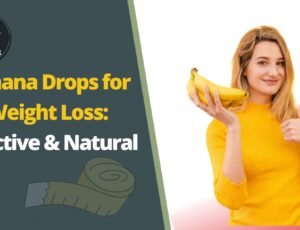
Why Choose High Protein Foods for Weight Loss and Muscle Gain
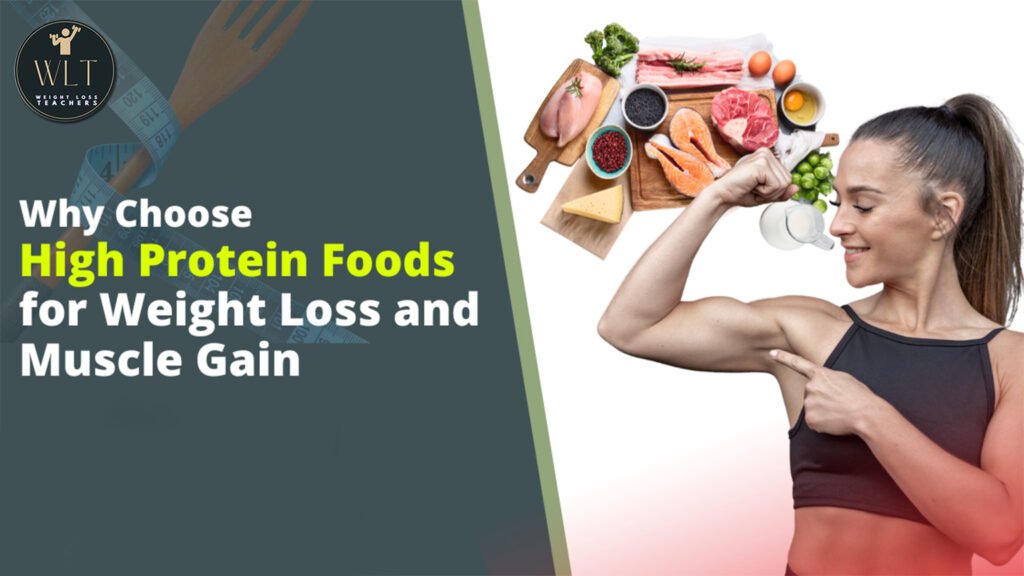
Protein is an important macronutrient that helps to keep your body in good shape and lose weight. In recent years, high-protein diets have become very popular because they work effectively to help people lose weight.
Table of Contents
Introduction
This article will discuss high protein foods for weight loss. It will look at the benefits and risks of these diets and give detailed advice on how to follow them successfully.

What is a High Protein Diet?
A high-protein diet is a way of eating that focuses on eating more protein while consuming less carbohydrates and fat. Usually, 25–30% of daily calories come from protein through a high-protein diet, which is more than the recommended daily intake of 10-15%. Therefore, such a diet tends to be low in fat and carbs.
How High Protein Diets Help You Lose Weight?

When it comes to losing weight, eating a lot of protein can help in many ways. Here are a few of the most important benefits of consuming high protein foods for weight loss:
More Calories Burned
One of the best things about high-protein diets is that they can speed up your metabolism. Protein has a higher thermic effect than carbohydrates or fat. This means that the body uses more calories to digest and absorb protein. Thermic effect of food (TEF) is the name for this effect. TEF is the amount of energy we use to digest, absorb, and use the nutrients we eat. Protein has the highest TEF among all the macronutrients, accounting for approximately 20-30% of the total calories consumed from protein. In comparison, carbohydrates have a TEF of 5-10%, while fats have a TEF of 0-3%.
By consuming the best protein foods for weight loss, individuals can effectively increase their daily energy expenditure. This can contribute to a greater calorie deficit, which is essential for weight loss. In a study released in the American Journal of Clinical Nutrition, researchers found that high-protein diets led to significantly higher energy expenditure compared to lower protein diets. This increased metabolic rate persisted even during times of rest, further promoting weight loss and improved body composition.
Additionally, high-protein diets support the maintenance of lean muscle mass during weight loss. When individuals limit their calorie intake to lose weight, they often experience a decrease in muscle mass along with fat loss. However, a high-protein diet can help mitigate muscle loss by giving the necessary amino acids for muscle maintenance and repair. Preserving muscle mass is important as it contributes to a higher resting metabolic rate. This means that even at rest, people with more lean muscle burn more calories than those with lower muscle mass. Therefore, the increased metabolism associated with high-protein diets can be traced to both the thermic effect of protein and the preservation of lean muscle mass.
In conclusion, high protein diets for weight loss increase metabolism through the thermic effect of protein and aids to preserve lean muscle mass. By incorporating the best protein foods for weight loss in diet, people can enhance their energy expenditure and achieve greater success in achieving their weight loss goals.

Reduced Appetite
Another major benefit of high protein diets for weight loss is their ability to reduce appetite. Protein is the most satiating macronutrient, meaning it promotes feelings of fullness and lowers hunger cravings. Several mechanisms add to the appetite-suppressing effects of protein.
Firstly, protein affects the release of hormones involved in appetite regulation. When protein is eaten, it stimulates the release of hormones like peptide YY (PYY), glucagon-like peptide-1 (GLP-1), and cholecystokinin (CCK), which send signals to the brain to promote satiety and reduce food intake. These hormones act on the hypothalamus, the region of the brain responsible for appetite control.
Additionally, protein has a slow digestion rate compared to carbs. This slow digestion and absorption process prolongs the release of amino acids into the bloodstream, giving a sustained sense of fullness and preventing rapid spikes and drops in blood sugar levels. This steady release of amino acids helps regulate hunger and stops overeating.
Furthermore, high protein foods for weight loss often result in higher dietary thermogenesis, as stated earlier. The increased energy expenditure involved with the digestion and absorption of protein can contribute to feelings of satiety and reduce the desire to consume additional calories.
Several studies support the appetite-suppressing benefits of high-protein diets. In a study published in the Journal of the American College of Nutrition, researchers found that individuals who consumed a high-protein breakfast experienced decreased hunger and cravings throughout the day compared to those who consumed a high-carbohydrate breakfast. Another study published in the Nutrition Journal found that participants who consumed high protein foods for weight loss experienced significant reductions in hunger and a decreased desire to eat late at night.
By reducing appetite and curbing hunger, high-protein diets help individuals stick to their weight loss plan more effectively and consume fewer calories overall.

Gain in Muscle Mass
A high-protein diet is a key part of building muscle bulk. Protein is what makes up muscles, so getting enough of it is important for building and repairing muscles. When people do resistance training or strength workouts, they need a high-protein diet even more to help their muscles grow.
Muscles grow through a process called muscle protein synthesis (MPS), in which new proteins are made to fix and build muscle tissue. When you eat enough high protein foods for weight loss and muscle gain, you get the amino acids you need to support MPS. This helps your muscles change and grow stronger. Researchers have found over and over again that people who eat high protein foods for weight loss and muscle gain have more muscle protein synthesis and make bigger gains in muscle growth.
A high-protein diet can help you keep your muscle strength while you lose weight. When people try to lose weight by cutting back on calories, they may lose both fat and muscle strength. But eating high protein foods for weight loss and muscle gain helps stop muscle loss by giving your body the amino acids it needs to keep and fix muscles. Keeping muscle bulk is important because, as we’ve already said, it helps you have a higher resting metabolic rate. By getting more lean muscle mass, people can speed up their metabolism, burn more calories at rest, and control their weight better in the long run.
To get the most muscle-building benefits from high protein foods for weight loss and muscle gain, it’s important to do resistance training exercises on a daily basis. Resistance training speeds up the process of making protein in the muscles and makes them need more protein to grow and repair. People can maximize muscle growth and reach their body composition goals by eating a high-protein diet and working out in the right way.
In conclusion, high-protein meals help build and keep muscle. By giving people the amino acids they need, these diets boost muscle protein synthesis and help people build and keep muscle strength. This not only makes you smaller, but it also raises your resting metabolic rate, which helps you keep your weight down in the long run.

Less Fat on the Body
People who eat the best protein foods for weight loss tend to have less body fat. Several things add to this benefit, which makes high-protein diets a good way to change the way your body looks.
First, we’ve already talked about how high-protein meals make you feel fuller. By making people less hungry and in control of their urges, they are less likely to eat too much or too many calories. This can cause a calorie shortage, which is what you need to lose weight. When the body regularly uses more energy than it takes in, it uses fat stored in the body as a source of fuel. This causes body fat to go down.
As was said in the first point, protein foods for weight loss also help speed up the metabolism. Because protein has a bigger thermic effect, the body burns more calories as it breaks it down and absorbs it. This higher calorie burn can help burn more fat, which can lead to a decrease in body fat.
Several studies have shown that high-protein meals help people lose fat. In a study that was released in the International Journal of Obesity, researchers found that people who ate a high-protein diet lost more body fat and weight than those who ate a low-protein diet. Another study released in the Journal of Nutrition found that high protein diets for weight loss were better than a standard protein diet at getting rid of belly fat and keeping lean muscle mass.
It’s important to remember that if you’re on a diet with the best protein foods for weight loss, you should choose lean types of protein to avoid getting too much saturated fat. Lean protein sources include skinless chicken, fish, lean cuts of meat, eggs, and foods like tofu and beans that come from plants. By choosing these lean protein sources, people can get the most fat-loss benefits from a high-protein diet while still keeping their heart health in good shape.
In conclusion, it has been shown that high-protein meals help people lose body fat. By making you feel fuller, raising your body temperature, and keeping your lean muscle mass, these diets help create a calorie shortage and make it easier to burn fat. By eating a balanced diet and getting protein from lean sources, people can make the most of the fat-burning effects of a high-protein diet while also improving their general health.

Better Insulin Sensitivity
Insulin sensitivity has also been shown to improve with high-protein foods. Insulin is a hormone made by the pancreas that helps control how much sugar is in the blood. Insulin sensitivity is how well the cells of the body react to insulin. When people have less insulin sensitivity, it can lead to insulin resistance. Insulin resistance is a condition that causes high blood sugar and a higher chance of getting type 2 diabetes.
Insulin sensitivity can be improved in many ways by eating a lot of protein. First, compared to carbs, protein has less of an effect on blood sugar levels. Protein has a small effect on blood sugar and insulin levels. Carbohydrates are broken down into glucose, which raises blood sugar and makes insulin release. By eating less high-carbohydrate foods and more protein instead, people can help control their blood sugar levels and become more sensitive to insulin.
Also, high-protein diets have been shown to change the way the body looks by lowering the amount of fat mass and increasing the amount of lean muscle mass. Insulin resistance is linked to having too much body fat, especially visceral fat (fat around the organs in the abdomen). People can make their bodies more sensitive to insulin by eating a high-protein diet that helps them lose body fat and gain lean muscle mass.
Several studies have shown that high protein foods for weight loss make insulin more sensitive in a good way. In a study that was released in the American Journal of Clinical Nutrition, it was found that a high-protein diet made people with type 2 diabetes much more sensitive to insulin. In another study that was released in the Journal of the American Medical Association, people who were overweight or obese and ate a high-protein diet had better insulin sensitivity and were less likely to get type 2 diabetes.
Even though high protein diets for weight loss can make insulin work better, it’s important to eat in a balanced way generally. It’s best to eat a range of nutrient-dense foods, like fruits, vegetables, whole grains, and healthy fats, to make sure your diet is well-rounded and gives you enough of the nutrients you need.
In short, studies have shown that meals high in protein make insulin work better. By reducing the amount of high-carbohydrate foods eaten, encouraging fat loss, and increasing lean muscle mass, these diets help control blood sugar levels and lower the chance of insulin resistance and type 2 diabetes.
Note: There might be affiliate links mentioned here. We may receive a commission if you purchase a product through an affiliate link. There is no additional charge for you. Please do your own research before making any online purchases.
Risks of Diets High in Protein
Even though high-protein diets can help you lose weight in many ways, it’s important to be aware of the risks that come with them. When people know about these risks, they can make better decisions and take the right measures regarding high protein diets for weight loss. Here are some important things to think about:

Kidney Damage
One of the biggest worries about high-protein diets is that they can put a lot of stress on the kidneys, especially in people who already have kidney disease. Waste products like urea and ammonia are made when protein is broken down. The kidneys clear these waste products out of the bloodstream and get rid of them through urine. A high-protein diet can make the kidneys work harder, and people whose kidneys don’t work as well may be more likely to get kidney damage.
But it’s important to remember that there isn’t much proof that high protein foods for weight loss are bad for healthy people with good kidney function. Most of the time, healthy kidneys can handle the extra protein without any problems. Still, people with kidney disease or other health problems linked to the kidneys should be careful and talk to a doctor before switching to a high-protein diet.

Dehydration
Dehydration is another problem that can happen when you eat a lot of protein. Protein needs more water to be digested and processed than carbs or fats do. Because of this, people who eat a lot of protein may need to drink more water to keep from getting dehydrated.
It is best to drink a lot of water throughout the day to stay properly hydrated. This is especially important when you run or do other physical activities that make you sweat more and lose more fluids. The color of pee can also help you figure out how well you are drinking. Urine that is clear or pale yellow is a good sign that you are getting enough water.

Nutrient Deficiencies
If your high-protein diet isn’t well-balanced, you might not get enough of some nutrients. Since protein is the main goal, there is a chance that you won’t get enough of other important nutrients like fiber, vitamins, and minerals.
Fiber is very important for gut health, and it also helps keep bowel movements regular. However many foods that are high in protein are low in fiber. So, people who eat a high-protein diet should make an effort to eat fiber-rich foods like veggies, fruits, whole grains, and legumes.
Also, if you only eat a few types of foods, your high-protein diet might not give you enough vitamins and minerals. It is important to get enough vitamins and minerals by eating a varied and well-balanced diet or, if necessary, by taking the right supplements.
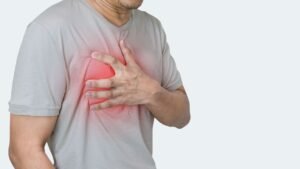
Risk of Heart Disease
Some high-protein meals, especially those with a lot of saturated fat, may make you more likely to get heart disease if you eat them too much. Even though protein itself is not linked to a higher chance of heart disease, it is important to think about where the protein comes from and what else you eat with it.
Saturated fat can be found in a lot of animal-based foods, like red meat and full-fat dairy. Heart problems are more likely to happen in people whose diets are high in fatty fat. So, if you want to eat less saturated fat, it’s important to choose lean sources of protein like skinless chicken, fish, low-fat dairy, and plant-based proteins like legumes and tofu.
Healthy fats, like monounsaturated and polyunsaturated fats found in nuts, seeds, avocados, and olive oil, can also help keep the total fat content of the diet in check and help keep the heart healthy.

Bad Breath and Diarrhea
When you eat a lot of protein, you might get bad breath or have trouble going to the bathroom. Most of these problems are caused by the fact that people who eat a lot of protein tend to eat less fiber.
Fiber is very important for a healthy digestive system and normal bowel movements. It gives stools more bulk, helps keep people regular, and helps good bacteria grow in the gut. But many high-protein foods are low in fiber, which can make you feel like you can’t go to the bathroom.
People who eat a high-protein diet should make sure to eat enough fiber-rich foods to get rid of these symptoms. Adding vegetables, fruits, whole grains, and beans to your diet can help keep your bowels healthy and stop you from getting constipated. If you need to, you can also use fiber supplements with the help of a medical worker.
In conclusion, high-protein meals can help you lose weight in many ways, but you should be aware of the risks. People should think about their kidney health, drink enough water, try to eat a well-balanced diet to avoid vitamin deficiencies, choose lean protein sources to limit their intake of saturated fat and focus on fiber-rich foods to keep their digestion healthy.
How to Lose Weight with High-Protein Diets
To lose weight, you need to plan and think about the best protein foods for weight loss. Here are some tips that can help people start and stick with a high-protein diet:
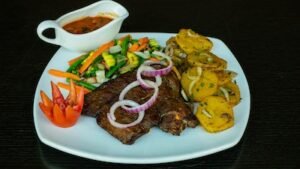
Determine Your Protein Needs
Step one of eating a high-protein diet is to figure out how much protein you need. This can be different for different people based on their age, gender, weight, level of physical activity, and health goals in general. As a general rule of thumb, most people who want to lose weight should eat between 0.6 and 1 gram of protein per pound of body weight.

Consume Protein Sources That Are Low in Fat
Focusing on lean protein sources is important if you want to make sure that your high-protein diet is also low in fat. Some examples of lean protein sources are skinless birds (chicken, turkey), fish (salmon, tuna), lean cuts of meat (beef, pork), eggs, low-fat dairy products (Greek yogurt, cottage cheese), and plant-based proteins (tofu, tempeh, legumes, quinoa).
Choosing lean protein sources keeps you from eating too many bad saturated fats and helps you eat a diet that is good for your heart.

Focus on Nutrient-Dense Foods
Even though protein is an important part of high protein diets for weight loss, it is just as important to eat nutrient-dense foods to make sure you get all the nutrients you need. Nutrient-dense foods are full of vitamins, minerals, and fiber that are important to your health as a whole.
To make sure your meals are well-balanced, eat a range of vegetables, fruits, whole grains, and healthy fats along with the best protein foods for weight loss. These foods not only give you the nutrients you need, but they also help you feel full and satisfied.
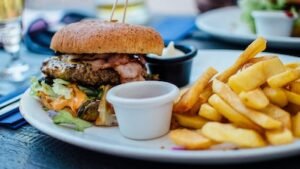
Stay Away from Processed Food
To keep a diet that is high in protein and low in carbs, it is important to limit or avoid processed foods. Processed foods often have a lot of refined carbs, extra sugars, unhealthy fats, and too much sodium, which can make it harder to lose weight.
Try not to eat or eat as little as possible of foods like white bread, pasta, sugary snacks, and sweets. Instead, choose options that are whole foods that are high in protein and have other health benefits.

Drink Plenty of Water
Adequate hydration is important for general health and proper bodily functions. Since high-protein meals can make the body need more water, it’s important to drink a lot of water all day long.
Water not only helps you digest food and absorb nutrients, but it also helps your body run. It can also help with side effects like constipation which can happen when you don’t eat enough fiber.

Keep Track of What You Eat
Keeping track of how much protein you eat is important to make sure you meet your diet goals and don’t eat too much. While following high protein meal ideas for weight loss, use a food log or a mobile app to keep track of what you eat every day and make sure you’re getting the right amount of protein for your needs. This can help you make changes if you need to and keep a healthy diet.
In addition to protein, keep track of your total calorie intake and macronutrient distribution. While high-protein diets focus on protein consumption, it is still important to keep an appropriate balance of carbohydrates and fats to meet your overall nutritional needs. Consult with a registered dietitian or nutritionist if you need help in determining an appropriate protein foods list for weight loss while ensuring the optimal macronutrient distribution for your individual goals.

Speak with a Healthcare Provider
Before starting a diet with high protein meal ideas for weight loss, it’s important to talk to a doctor, especially if you have any health problems or worries already. They can give you advice that is tailored to your needs, help you track your progress, and deal with any possible risks or problems.
A health care provider can also help you figure out how much protein you should eat, and suggest a protein foods list for weight loss taking into account things like your general health, age, level of activity, and any dietary restrictions or allergies you have.
FAQs
Are diets high in protein good for everyone?
Some people may not be able to eat a high-protein diet, especially if they already have kidney problems. Before starting a high-protein diet, it is important to talk to a healthcare provider to see if it is right for your needs and health.
When I eat a high-protein diet, how much protein should I eat?
On a high-protein diet, the amount of protein you eat can change based on your weight, age, and level of exercise. In general, you should eat between 0.6 and 1 gram of protein per pound of body weight. But the best way to figure out how much protein you need for your goals is to talk to a doctor or qualified dietitian.
Can eating a lot of protein help your muscles grow?
Yes, a diet high in protein can help muscles grow. Protein is important for building and fixing up muscles. By eating the best protein foods for weight loss and doing resistance training routines, people can help their muscles grow and get stronger.
If I eat a lot of protein, will I feel fuller?
Yes, a high-protein diet is known to make you feel fuller and less hungry. Protein is the macronutrient that makes you feel fullest, so eating more protein can help you control your hunger and stop you from eating too much.
Can a high-protein diet make you lack certain nutrients?
If your high-protein diet isn’t well-balanced, you might not get enough fiber, vitamins, minerals, and other nutrients. To get enough of the necessary nutrients, it’s important to eat nutrient-dense foods like fruits, vegetables, and whole grains.
Are diets high in protein bad for the kidneys?
People who already have kidney disease may find that a high-protein diet puts more stress on their kidneys. But there isn’t much evidence to show that high-protein diets are bad for people with good kidneys. Before starting a high-protein diet, you should talk to a doctor or nurse to find out how healthy your kidneys are.
Can a diet with a lot of protein help you lose weight?
Yes, meals with a lot of protein have been shown to help people lose weight. They can speed up your metabolism, cut your hunger, keep your muscle mass, and help you lose fat, all of which help you lose weight.
Should I stay away from all carbs on a high-protein diet?
Even though high-protein meals tend to have fewer carbs, you don’t have to cut all carbs out of your diet. For a balanced and healthy diet, it’s important to get carbs from whole grains, fruits, and veggies instead of processed foods.
Can eating a lot of protein make you more likely to get heart disease?
Some high-protein foods that are also high in saturated fat may make heart disease more likely. To lower this chance, it’s best to eat lean protein sources and healthy fats, like those found in nuts, seeds, and avocados.
Does a high-protein diet require you to keep track of how much protein you eat?
Keeping track of your protein intake can help you make sure you’re getting enough protein and eating a healthy diet. It can help you track your success and change things if you need to. Keeping a food diary or using a mobile app can help you keep track of your protein intake, as well as your total calorie intake and how you’re getting your macronutrients.
Conclusion
A high-protein diet can be a good way to lose weight and improve your health as a whole. By speeding up your metabolism, lowering your appetite, helping your muscles grow, reducing your fat, and making your body more sensitive to insulin, these diets have many benefits. But it’s important to know about possible risks, such as kidney stress, dehydration, nutrient deficiencies, a higher chance of heart disease, and side effects like bad breath and constipation.
By eating a high-protein diet the right way, people can reduce these risks and get the most out of the benefits. To do this, you need to figure out how much protein you need, include lean protein sources, focus on nutrient-dense foods, avoid processed foods, stay hydrated, track what you eat, and talk to a healthcare provider.
As with any diet plan, it’s important to understand that different people have different needs. A high-protein diet might not be good for everyone, so it’s best to get specific advice from a health professional for personalized high protein meal ideas for weight loss. People can get the benefits of a high-protein diet while staying healthy and reaching their weight loss goals if they take a balanced, long-term approach.
Disclaimer: The information provided in this article is for educational purposes only and should not be considered as a substitute for medical advice. Consult a healthcare professional before implementing any home remedies or making significant changes to your lifestyle.


